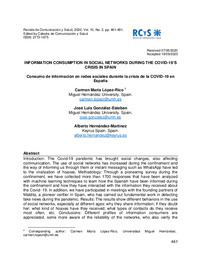Título :
Information consumption in social networks during the COVID-19’s crisis in Spain |
Autor :
López Rico, Carmen María
González-Esteban, José Luis
Hernández Martínez, Alberto |
Editor :
Universidad Complutense de Madrid |
Departamento:
Departamentos de la UMH::Ciencias Sociales y Humanas |
Fecha de publicación:
2020 |
URI :
https://hdl.handle.net/11000/34817 |
Resumen :
Introducción: La pandemia de Covid-19 ha traído cambios sociales afectando igualmente a la comunicación. El uso de las redes sociales ha aumentado durante el confinamiento y la forma de informarnos a través de ellas o de mensajería instantánea como WhatsApp han propiciado la viralización de bulos. Metodología: A través de una encuesta pionera durante el confinamiento hemos recopilado más de 1700 respuestas que se han analizado con técnicas de machine learning para conocer cómo se han informado los españoles durante el confinamiento y como han interactuado con las informaciones que recibían sobre la Covid-19. Además, hemos participado en encuentros con los socios fundadores de Maldita, verificador pionero en España, que ha realizado una labor fundamental en la detección de fake news durante la pandemia. Resultados: Los resultados muestran diferentes comportamientos en el uso de las redes sociales sobre todo en las distintas edades: por qué comparten una información; si dudan sobre ella; qué tipo de bulos han recibido; de qué tipos de contactos reciben con más frecuencia, etc. Conclusiones: Se aprecian distintos perfiles de consumidores de información, unos más concienciados con la fiabilidad de las redes, que además verifican el contenido dudoso y otro que se informa de forma más superficial y que no verifica la información que le llega por estos canales online.
Introduction: The Covid-19 pandemic has brought social changes, also affecting communication. The use of social networks has increased during the confinement and the way of informing us through them or instant messaging such as WhatsApp have led to the viralization of hoaxes. Methodology: Through a pioneering survey during the confinement, we have collected more than 1700 responses that have been analyzed with machine learning techniques to learn how the Spanish have been informed during the confinement and how they have interacted with the information they received about the Covid- 19. In addition, we have participated in meetings with the founding partners of Maldita, a pioneer verifier in Spain, who has carried out fundamental work in detecting fake news during the pandemic. Results: The results show different behaviors in the use of social networks, especially at different ages: why they share information; if they doubt her; what kind of hoaxes have they received; what types of contacts do they receive most often, etc. Conclusions: Different profiles of information consumers are appreciated, some more aware of the reliability of the networks, who also verify the dubious content and another that is reported in a more superficial way and that does not verify the information that comes through these online channels.
|
Palabras clave/Materias:
Covid-19
Social networks
WhatsApp
Fake News
Health information
Fact checkers
information consumption
Redes Sociales
Información sanitaria
Verificadores de información
Consumo de información |
Área de conocimiento :
CDU: Ciencias sociales |
Tipo de documento :
info:eu-repo/semantics/article |
Derechos de acceso:
info:eu-repo/semantics/openAccess
Attribution-NonCommercial-NoDerivatives 4.0 Internacional |
DOI :
https://doi.org/10.35669/rcys.2020.10(2).461-481. |
Publicado en:
Revista de Comunicación y Salud, 10(2), 461-481. |
Aparece en las colecciones:
Artículos Ciencias Sociales y Humanas
|

 La licencia se describe como: Atribución-NonComercial-NoDerivada 4.0 Internacional.
La licencia se describe como: Atribución-NonComercial-NoDerivada 4.0 Internacional.
.png)